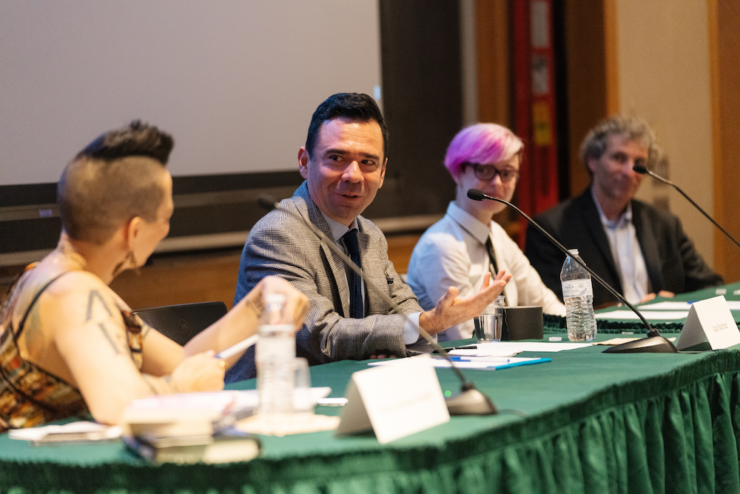After a successful inaugural year, The Neukom Institute for Computational Science at Dartmouth College has announced the 2019 Neukom Institute Literary Arts Awards. Established in 2017, the award honors speculative fiction works in book form (debuts and otherwise) as well as plays. It also recognizes the relationship between science and the arts, the latter which the award website describes as “[a]cting as gadfly for the good, provocateur and satirist when the sciences overreach, but also far-seeing prophets of scientific potential.”
The inaugural winners were Juan Martinez for Best Worst American (in the debut category), Lavie Tidhar’s Central Station and Corinne Duyvis’ On the Edge of Gone (in the open book category), and Jessica Andrewartha’s play Choices People Make.
“It was exciting to see such a diversity of entries with many different takes—from authors of many different nationalities—on speculative fiction,” said Daniel Rockmore (Associate Dean for the Sciences, Dartmouth College, and Director, Neukom Institute for Computational Science at Dartmouth College). “This established a great precedent that we hope to repeat as we accept submissions for the current awards cycle. As our inaugural shortlist shows, we received exciting new work from well-known authors like Kim Stanley Robinson as well as fascinating work from new authors including debut winner Juan Martinez. Our winners represent three different genres and shared a theme of hope for the future and the enduring nature of the very human quest for connection.”
At the awards ceremony earlier this month, moderator Maria Dahvana Headley (The Mere Wife) described the books as all having “deeply human grounding in emotion, in longing, in love, in relationships between each other. Which is a really interesting place to begin in thinking about this as a speculative fiction and futuristic prize… The idea that we would still remain people who love other people was, for me, the unifying theme.” She went on to say that “I find these books very hopeful. They were full of recognition of people who are not currently being recognized in our societies in every kind of way. This list of winners is the same thing. It’s people who are, in American circles, often not as recognized.”
You can watch the entire panel here:
Speculative fiction is more relevant than ever, Rockmore told us: “We seem to be at an important historical decision point about the future direction of society both in the large and the small. Speculative fiction shines a light not only on the possible futures of our world, but also the parts of our current world that could grow to drive the future; the Neukom Awards are meant to honor and support that important literary tradition. The best speculative fiction immerses the reader in these imagined worlds and by doing so encourages the reader to ponder if this is the kind of world she/he wants to inhabit—or wants future generations to inhabit. Literature is perhaps one of the last bastions of this kind of thoughtful and transparent consideration of the future in light of the present. It is both relevant and important.”
The submission window recently opened for the second year of the Neukom Institute award. Asked how they are approaching the second season, Rockmore responded, “We are not just award judges, we are readers. We can’t wait to read the next crop of speculative fiction that is being submitted for the second Neukom season. We are hoping that we can build on the success of the inaugural year of the Neukom Institute Literary Arts Awards to gather an even stronger and broader collection of submissions for this year. We continue to welcome speculative fiction in all of its many forms and look forward to continuing to bring greater attention to this important genre.”
Eligible books include any works published no earlier than June 1, 2016 or under contract to be published no later than December 31, 2018; the submission deadline for all three awards is December 31. More detailed submission guidelines here. The awards will be announced in spring 2019.










